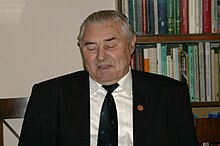Guri Ivanovich Martschuk
Guri Iwanowitsch Martschuk ( Russian Гурий Иванович Марчук , English transcription Guri Ivanovich Marchuk ; born June 8, 1925 in Petro-Chersonez, today in Orenburg Oblast ; † March 24, 2013 in Moscow ) was a Russian mathematician , known for applied work in meteorology .
Career
Martschuk completed his habilitation in 1957 (Russian doctorate) and was a member of the Soviet Academy of Sciences one year later in 1958 . He was for a long time at the Siberian Department of the Soviet Academy of Sciences in Novosibirsk and taught at the Novosibirsk University .
In 1980 he organized the Numerical Mathematics Department in the Russian Academy of Sciences and was its director from 1980 to 2000. It later became the Academy's Institute for Numerical Mathematics (INM RAS), of which he was Honorary Director.
Martschuk dealt with the mathematical modeling of climate and weather models as well as their numerical treatment. He developed the "splitting" method for solving the hydrodynamic differential equations used in meteorology. Another breakthrough came with the development of the method of adjoint equations in inverse problems for modeling meteorological problems. The method is important in data initialization processes and error analysis in weather forecasts and is also used, for example, to retrospectively localize polluters. Martschuk also deals with questions of mathematical modeling of the immune system and its reaction to pathogens (a Russian book by him on this was published as early as 1980) as well as with numerical modeling of nuclear explosions and nuclear reactors (a Russian book by him was published in 1961).
He was President (previously Vice President) of the Siberian Department of the Russian Academy of Sciences and was also President of the Russian Academy of Sciences from 1986 to 1991. He was a foreign member of the French (1989), Polish, Czechoslovak, Bulgarian, Indian and Finnish Academy of Sciences. In 1972 he also became a foreign member of the Academy of Sciences of the GDR . He has received several honorary doctorates (including Dresden, Toulouse). He received the gold medal of the Czechoslovak Academy of Sciences, the German Karpinsky Medal, the Demidow Prize , the Keldysch Gold Medal and the Chebyshev Gold Medal . He was a knight of the French Legion of Honor . In 2002 he received the Padma Bhushan from the Indian President (together with Yevgeny Petrovich Tschelyschew ). In 2008 he received the Wilhelm Bjerknes Medal. In 1970 he gave a plenary lecture at the ICM in Nice (Methods and problems of computational mathematics) and in 1966 he was invited speaker at the ICM in Moscow (Numerical Methods in Transfer Theory) .
Fonts
- Science and Sibiria , Moscow, Novosti Press, 1983
- Editor: Numerical Methods and Applications , CRC Press, Boca Raton 1994
- with Valeri Agoshkov, Victor Shutyaev: Adjoint equations and perturbation algorithms in nonlinear problems , CRC Press 1996
- Adjoint equations and the analysis of complex systems , Kluwer 1995
- Mathematical modeling of immune response in infectious disease , Kluwer 1997
- Mathematical models in environmental problems , Elsevier 1986
- with Wjatscheslaw Iwanowitsch Lebedew Numerical methods in the theory of neutron transport , Chur, New York: Harwood, 2nd edition 1986
Web links
- Literature by and about Guri Iwanowitsch Martschuk in the catalog of the German National Library
- Bjerknes Prize for Martschuk
- INM RAS website
- Page to Martschuk at mathnet.ru
- Entry at the Academie des Sciences
Individual evidence
- ^ Death report from the ITAR-TASS news agency
- ↑ Padma Vibhushan for Rangarajan, Soli Sorabjee . In: The Hindu . January 26, 2002.
| personal data | |
|---|---|
| SURNAME | Martschuk, Guri Ivanovich |
| ALTERNATIVE NAMES | Марчук, Гурий Иванович (Russian); Marchuk, Guri Ivanovich (English transcription) |
| BRIEF DESCRIPTION | Russian mathematician |
| DATE OF BIRTH | June 8, 1925 |
| PLACE OF BIRTH | Petro-Chersonets, today part of Orenburg Oblast |
| DATE OF DEATH | March 24, 2013 |
| Place of death | Moscow |
